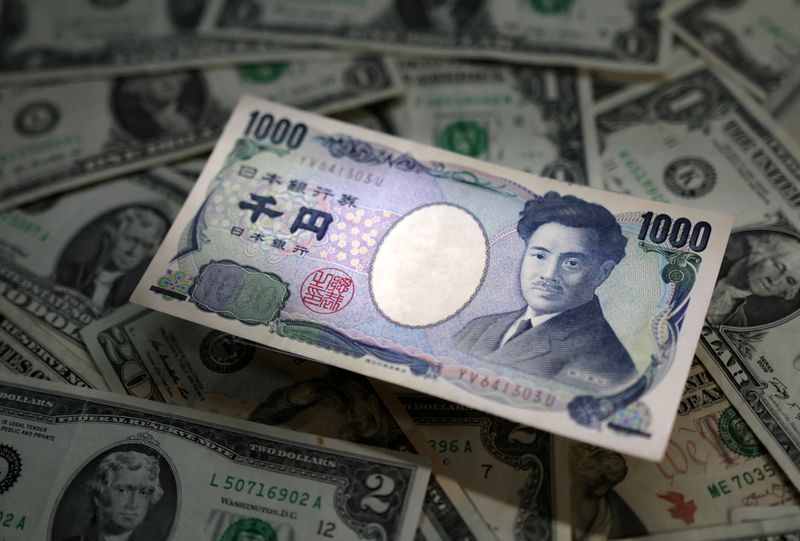[ad_1]

© Reuters. FILE PHOTO: Japanese Yen and U.S. dollar banknotes are seen in this illustration taken March 10, 2023. REUTERS/Dado Ruvic/Illustration
By Herbert Lash and Joice Alves
NEW YORK/LONDON (Reuters) – The dollar advanced against major currencies on Tuesday after relatively solid data on U.S. manufacturing and construction offset a decline in job openings last month to the lowest level in more than two years.
While an ISM survey offered a tough assessment of U.S. manufacturing conditions, so-called hard data suggest the sector is shuffling along. Federal Reserve data in June showed factory production rebounded in the second quarter, ending two straight quarterly declines.
Meanwhile, U.S. construction spending increased solidly last month and May’s data was revised higher, boosted by outlays in both single and multifamily housing projects, the Commerce Department said.
The monthly Job Openings and Labor Turnover Survey, or JOLTS report from the Labor Department, remained consistent with tight labor market conditions despite hefty interest rate increases by the Fed to dampen demand and curb inflation.
The dollar initially slid on the reports, but later rebounded.
“The net between the slightly more positive ISM and the slightly less favorable JOLTs numbers, you wind up in an environment the market doesn’t know what to do,” said Steven Ricchiuto, U.S. chief economist at Mizuho Securities USA LLC.
“The ISM numbers are really net neutral to slightly more constructive, but the reality is the offset in the JOLTs numbers with the continued high levels of openings in terms of what we got in terms of the quit rate,” he said.
The , a measure of the greenback against six major currencies, rose 0.412%.
Earlier, the Australian dollar fell sharply after the Reserve Bank of Australia left cash rates unchanged and the yen slid to a three-week low as tweaks by the Bank of Japan to its yield curve control policy continued to weigh on the currency.
The Australian dollar was set for its sharpest daily drop in a month after the central bank held interest rates at 4.1% for a second month, saying past hikes were cooling demand but more tightening might be needed to curb inflation.
The fell 1.65% versus the U.S. dollar at $0.661, wiping out a 0.87% gain in July and putting it on track for its biggest daily decline since early March.
There are concerns that the de facto tightening by a major central bank could adversely affect global risk appetite, portfolio managers at Natixis Investment Managers said.
The yen weakened 0.74% at 143.33 per dollar.
The Asian currency has been on a wild ride since Friday, when the BOJ began what may become a slow shift away from decades of massive monetary stimulus, saying it would offer to buy 10-year Japanese government bonds at 1.0% in fixed-rate operations instead of the previous rate of 0.5%.
“Markets could test just how ‘flexible’ the BOJ will be in the months ahead,” said Carlos Casanova, senior Asia economist at UBP in Hong Kong, adding the subtle changes suggested the BOJ may be gearing up to changing the YCC target in 2023.
Private surveys showed that Asia’s factory activity shrank in July, as the region’s fragile recovery takes a hit from slowing global growth and weakness in China’s economy.
China’s Caixin/S&P Global manufacturing purchasing managers’ index (PMI) missed analysts forecasts and showed the first decline in activity since April. [CNY/]
The euro fell 0.21% to $1.097.
Markets are now pricing in a pause in rate hikes by the European Central Bank as euro zone inflation fell further in July, and the bloc returned to growth in the second quarter of 2023 with a greater-than-expected expansion.
“Something needs to happen to boost confidence in another 25bp ECB hike, or the positioning will drag euro/dollar down. Unless, of course, the U.S. data this week are bad enough to shift the conversation back to when the Fed will start easing,” said Kit Juckes, chief global FX strategist at Societe Generale (OTC:), in a note to clients.
Sterling was last trading at $1.2753, down 0.65% on the day.
Money markets now see a 60% probability that the Bank of England will hike rates by 25 basis points on Thursday. [IRPR]
========================================================
Currency bid prices at 11:08 a.m. (1508 GMT)
Description RIC Last U.S. Close Pct Change YTD Pct High Bid Low Bid
Previous Change
Session
Dollar index 102.2900 101.8900 +0.41% -1.160% +102.4300 +101.8400
Euro/Dollar $1.0972 $1.0997 -0.22% +2.40% +$1.1003 +$1.0952
Dollar/Yen 143.3400 142.2700 +0.75% +9.33% +143.4600 +142.2150
Euro/Yen 157.28 156.45 +0.53% +12.10% +157.4100 +156.4300
Dollar/Swiss 0.8758 0.8720 +0.44% -5.29% +0.8777 +0.8715
Sterling/Dollar $1.2753 $1.2835 -0.63% +5.46% +$1.2840 +$1.2751
Dollar/Canadian 1.3283 1.3189 +0.72% -1.96% +1.3300 +1.3188
Aussie/Dollar $0.6610 $0.6719 -1.60% -3.01% +$0.6723 +$0.6606
Euro/Swiss 0.9607 0.9587 +0.21% -2.91% +0.9624 +0.9578
Euro/Sterling 0.8603 0.8565 +0.44% -2.73% +0.8606 +0.8551
NZ $0.6140 $0.6210 -1.05% -3.22% +$0.6217 +$0.6137
Dollar/Dollar
Dollar/Norway 10.1990 10.0950 +0.99% +3.88% +10.2480 +10.1370
Euro/Norway 11.1954 11.1382 +0.51% +6.69% +11.2320 +11.1271
Dollar/Sweden 10.6065 10.5178 +0.59% +1.91% +10.6422 +10.5190
Euro/Sweden 11.6381 11.5702 +0.59% +4.38% +11.6580 +11.5685
[ad_2]
Source link


